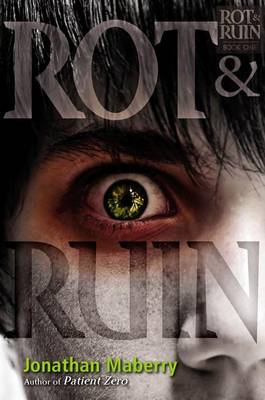Reviewed by nannah on
Content warnings:
ableist language
sexism
violence and gore
exoticism (possibly?)
The concept of this book sounded promising: in a post-apocalyptic world overrun with zombies, children need to get jobs once they turn fifteen or they'll lose their food rations. And Benny Imura's older brother, Tom, is a bounty hunter who kills zombies for a reward, and would like Benny to train under him.
Unfortunately, the execution of this idea is what lost me. I think a lot of what has to do with it is the book's tone, which is completely and unabashedly preachy. The book told me how to feel, rather than letting me feel it myself. It told me, through Tom mostly (the moral high ground of the book), that killing zombies was wrong because they used to be people. That I should care for the zombies. But it never actually led me through events that made me feel this way. I was just lectured on how I should feel–because the great Tom Imura said so.
On that same note, so much of the book's first half consisted of telling stories to Benny. This happened, then this happened, and it was tragic, and it was awful, and everyone should care about it. After so many stories, I really just didn't care.
Characters tended to be way too poetic and unnatural in dialogue and voice, especially when there was some element of romance or when Tom was trying to preach. The many clichés also turned me off to the writing. There were serious scenes that I just couldn't take seriously.
“What did you do?”
“What we had to do.”
(followed by a deep sigh or some sort of dramatic beat)
Another thing that tends to come hand-in-hand with the post-apocalyptic genre is sexism, and Rot and Ruin is definitely no exception. Beyond the fact that there are no female bounty hunters (you don't have to be explicitly sexist to still be sexist), Benny falls in love with the image of a young girl painted onto a trading card. From then on, he makes it his personal mission to find her–not just because he's curious and wants to get to know her, but because he has a deep need inside him to protect her from everyone. And when the only other main girl, Nix, gets kidnapped, he has another girl to add to his must-protect list.
I was really tempted to give up this book when Nix said, “Look… I'm sorry for being such a girl.” Because that really says so much about what Maberry thinks about girls in general and what he thinks girls think about other girls (or what they should think, since Nix is obviously supposed to be the heroine girls are supposed to look up to if they're reading this book). I really almost quit this book, and I don't do that often.
Okay I need to preface this next part by saying that I'm white, and though Maberry gets props for having his main character a PoC, I'm not so comfortable with the way the half-Japanese Benny Imura was treated. In many ways, Benny's older brother was like the stereotypical East Asian sage character who teaches someone rasher and younger how to fight. It was also interesting how Tom knew so much Japanese fighting terms and how he knew how to fight “like a samurai,” even though his parents died when he was very young (what was he, six?). As far as I know, no one else in Mountainside was Japanese, and Maberry went to lengths to describe everyone's ethnicities (e.g. "despite their very Vietnamese appearances, they were born in America" --another part I side-eyed the heck out of, actually).
But despite all this, there were some good things. Mainly Nix's ambition and her small moments that didn't revolve around Benny: her ideas about not being ruled by fear and expanding and moving it out of mountainside, etc.
All in all, I don't think this book had strong enough plot, characters, or writing for me to enjoy it fully. It praised toxic masculinity ("it was time for me to become a man" -- by killing people) and forced certain ideas down my throat while being unkind to women . . . and it was just not my thing.
Reading updates
- Started reading
- 23 December, 2014: Finished reading
- 23 December, 2014: Reviewed
